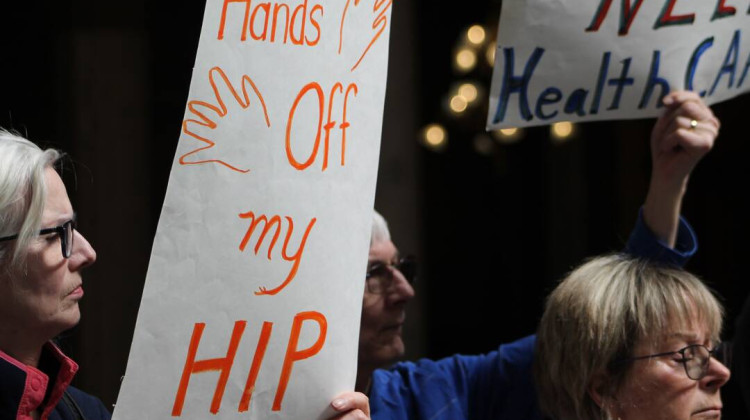
Officer Ron Meyers in Ross County, Ohio. Photo: Seth Herald/For Side Effects Public Media
Officer Ron Meyers drove down a dirt road 20 minutes outside the small city of Chillicothe, Ohio. As he passed each home, he slowed down and squinted, searching for an address. Out here, the house numbers are written on the front of homes in marker or in faded numbers clinging to old mailboxes. There’s no GPS.
Meyers wasn’t in pursuit of a criminal or responding to a 911 call. He was looking for the home where, last week, a person overdosed.
Every Wednesday morning, PORT, the Post Overdose Response team, meets at the Ross County Sheriff's department. There’s a cop, a deputy, a nurse from the health department and an addiction services counselor from a local treatment center. Together, they look into overdoses reported during the previous week and then set out to follow up with each person.
The objective: get people into addiction treatment.
Taking a proactive approach
After a string of fatal overdoses last year, leaders in this southern Ohio county were at the end of their rope. A group of stakeholders met and decided to develop a program that brings an addiction intervention to the doorstep of a struggling addict.
With few resources and a small budget, Ross County is trying a proactive approach that could be working. Since the start of this year, PORT has knocked on the doors of nearly 250 homes and brought more than 30 people into treatment.

The PORT team outside a home where a person overdosed the week before. Photo: Seth Herald/For Side Effects Public Media
Deputy Dave Weber has been with PORT since the beginning. He said in past, PORT’s had to follow up with dozens of overdoses in a single day, but recently there’s been a decline in the number.
“Last week we had one [overdose],” said Weber. “The week before we had three, maybe, and this week we’ve actually got just two.”
Whether it will last remains to be seen, but it’s good news for a county that just last year reported one of the highest fatal overdose rates in Ohio.
Knocking on doors
On the dirt road outside of Chillicothe, Meyers said PORT offers law enforcement a less traditional role. Rather than make arrests, his job is to understand addiction and offer people a potential solution.
“You have to solve the problem,” said Meyers. “Why are people doing this, what can we do to get them off of it?”
If a person lacks transportation, an officer will drive them to treatment. If beds are full in the surrounding area—as can often be the case—an officer will drive them to a facility in the next state over.
Meyers turned left at a Winnebago camper. Tucked behind it was the address he was looking for. The rest of the PORT team pulled up in a separate car. Together, the group of five walked up to the double-wide trailer and knocked at the front door.
One of PORT’s biggest challenges is getting the person on the other side to open up. About half the people PORT visits don’t answer the door.
'Grateful'
Jessica Lutz remembers when the team showed up at her home. The deputy was not in his full uniform—in PORT, law enforcement wear a black polo and khakis to appear less intimidating. Peering through the blinds, Luts knew exactly who he was.
“I saw an officer and then I saw this woman and I thought, 'Oh crap what did I do now?'” said Lutz, who was living with her parents.
At the time, Lutz was 30 and had been struggling with opioid addiction for 12 years. She had tried to get clean before. A few months earlier, Lutz was arrested for stealing her parents' car to buy heroin. She detoxed at the local hospital before turning herself in, but she relapsed after she was released from jail.
On that day at her parent’s house, Lutz said the social worker said exactly what she needed to hear and she buckled.
Lutz told the women she wanted to go to inpatient treatment, and the process of finding her a bed started that very day.
“If I wouldn’t have answered that door or talked to them, I don’t even know if I’d be alive,” said Lutz.
On a recent warm October day, Lutz was home with her 1-year-old son, Jace. He ran around the kitchen as she filled his bottle with grape juice. When she went away for nearly a year of inpatient treatment, Jace was still a newborn. Now that she’s been back home for a few months, Jace has started to call her mom.
“He would say mom, but he didn’t know who mom was,” said Lutz.
Lutz lives with her fiancé, also a recovering addict, and is working on getting custody back of her two older daughters. While she looks for work, she stays home with Jace, cooks dinner and helps her daughters with homework.

Lutz says she's adjusting to being a mom and being with her kids. Photo: Seth Herald/For Side Effects Public Media
“It might be a boring life to some people, but it’s stuff that I took for granted and I’m really grateful for these days,” she said.
Lutz says PORT offers something most addicts are unable to do for themselves: access to resources.
“Most of us don’t want to wake up and do what we do each day, but we don’t know how not to,” she said.
Before PORT, she would try in vain to get herself into treatment. She’d call around to rehab centers, leave voicemails and never hear back. PORT has established relationships and knows how to navigate the web of treatment options to get people the help they need.
A trail runs cold
Back at the double-wide trailer, a woman in a t-shirt and jeans answered the door. The PORT team stood with her on her front porch, talking for about 20 minutes.
They learned she’s the friend of the person who overdosed, and there are no clues as to where that person is now. They left the woman with several pamphlets on treatment options and information about addiction.
Meyers said he knows she might just throw them away, but he hopes she’ll read them.
This story was produced by a partnership between Side Effects Public Media and WOSU News.
 DONATE
DONATE







 Support WFYI. We can't do it without you.
Support WFYI. We can't do it without you.